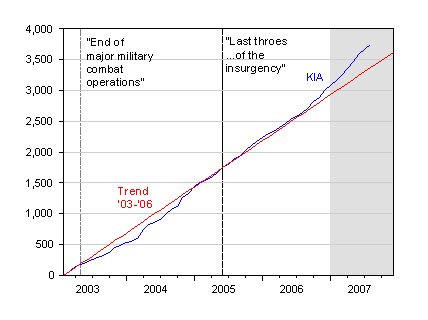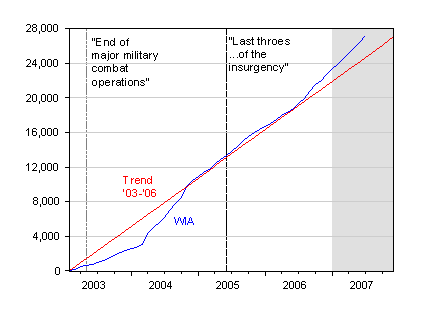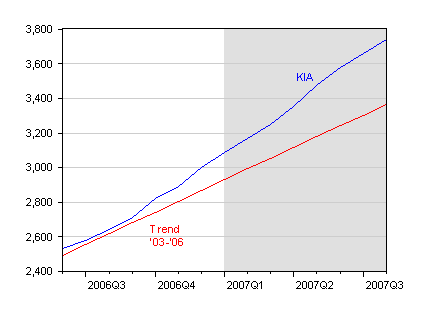I thought it would behoove us to actually inspect the data and look at the trends (as opposed to listening to Administration officials) associated with operations in the Iraqi theater.

Figure 1: Cumulative fatalities in Iraqi theater of operations, through June (blue), and trend based on sample up to December 2006 (red). Gray shading denotes 2007 data. Source: Iraq Coalition Casualty Count accessed on 12 September 2007.

Figure 2: Cumulative Wounded in Iraqi theater of operations, through July (blue), and trend based on sample up to December 2006 (red). Gray shading denotes 2007 data. Source: Iraq Coalition Casualty Count accessed on 12 September 2007.
As is obvious, both series are above trend, and exhibit little evidence of reverting to the 2003-06 trend.
My previous statements concerning the “burn rates” in Iraq hold a fortiori. No reason to believe they are dropping below the $10 billion per month cited in this post.
Recommended reading: GAO, “Securing, Stabilizing, and Rebuilding Iraq: Iraqi Government Has Not Met Most Legislative, Security, and Economic Benchmarks,”
GAO-07-1195, September 4, 2007.
[Late Addition: 14 Sep, 10:15pm Pacific]

Detail of Figure 1: Cumulative fatalities in Iraqi theater of operations, through June (blue), and trend based on sample up to December 2006 (red). Gray shading denotes 2007 data. Source: Iraq Coalition Casualty Count accessed on 12 September 2007.

Detail of Figure 2: Cumulative Wounded in Iraqi theater of operations, through July (blue), and trend based on sample up to December 2006 (red). Gray shading denotes 2007 data. Source: Iraq Coalition Casualty Count accessed on 13 September 2007.
Technorati Tags: Iraq, casualties,the surge, burn rates.
Prof Chinn,
shouldn’t you normalise the KIA/WIA numbers by the amount of soldiers in Iraq?
If there are more Americans because of the surge, there are more people for the insurgents to kill and wound.
Could you please just plot ’07? Looks like we’re back to trend lately, but hard to judge with the scale zoomed out.
I’m a retired military officer, served in SEA and Desert Storm and my son had two tours to Iraq. I don’t really like to comment on the Iraq war anymore given the depth of my despair over it but feel it’s necessary here. As is usually the case, numbers can be meaningless and never more so than in describing military losses. It is true that the casualties of this fiasco are relatively low; but that is meaningless if they died needlessly which I believe to be the case. As an aside, those losses are probably greatly understated since only deaths that occur in country are counted, not those that die enroute to or in Germany after the fact.
The financial costs while not low have so far not been a burden to the economy (allegedly). Again, meaningless since this is the first war in American history that has been almost totally financed by debt with no sacrifice expected of the public. And, once again, I believe this number is also greatly understated despite the fact that this has been a war fought strategically on the cheap. Asymmetrical does not adequately describe this – I wonder what the $/dead insurgent cost is?
Perhaps most maddeningly, we have an administration that purposefully got us into this mess, it has no real strategy for exit yet like some naughty frat boys they will just smirk while others have to straighten it out as we continue to suffer casualties.
No, numbers really don’t tell the whole story in time or war. I just know this: every empire has begun their final descent when they entered a period of protracted war incurring great debt with a depreciating currency. Unlike numbers, history doesn’t lie.
To paraphrase Geo. C Scott in “Patton,” “Such a waste of a fine military.”
What the hell is an “insurgent”? It’s they’re damn country, they’re being occupied, they can kill their occupiers under international law.
What’s great about Iraq Massacre 2, as opposed to say the Vietnam War, where the United States merely wanted to destroy an example of independence from Western control (the “rotten apple” theory), is that the United States CANNOT leave Iraq if it wants a client regime there. And if it does leave, it loses absolutely EVERYTHING its massacred for in the past 5 years, plus 12 years of sanctions, plus decades of supporting Hussein’s brutal regime.
This conflict is very different, and I don’t believe the U.S. willingly departs combat forces under Dems/Repubs until we have chaos at home.
If we have increased our engagements of the enemy why would we expect a reduction in KIA/WIA? I am surprised the increase is so small, a smaller increase than in any major battle in any war in our nation’s history.
Menzie, thanks for the info.
There can be no real meaning to economic analysis in a war because the nature of war is destruction. A better analysis of success in Iraq would be an analysis of Iraqi economic activity since the conflict began. Are the Irais moving toward more prosperity or less?
The question of whether we should examine casualites directly or as a ratio of soldiers in Iraq is probably misleading. Looking at two similar metrics rather than merely at one is probably fairly useful. The surge is not an exogenous event, after all. It results from the failure of earlier troop levels to bring satisfaction. We could mislead ourselves badly if we stopped asking “how many US dead and wounded is required to do the job” and only asked “as a ratio of the troops we’ve committed, who many must suffer death or wounds to do the job”.
Can’t go with DickF’s assertion that economic analysis is inappropriate, especially when he then says “A better analysis of success in Iraq would be an analysis of Iraqi economic activity since the conflict began” since Dick is obviously calling for economic analysis after saying economic analysis is inappropriate.
One way to find out if an analytic approach is useful is to use it. If the process of analysis breaks down or if during the process we discover flaws, then we may be learning that we are on the wrong path. Analysis is simply an elaborate, disciplined way of asking questions. That is usually a good thing. Well worth trying any tool you have, and find out along the way if it is useful.
The picture painted by many reporters that have actually gone out of the safe zones and moved around Iraq, is that over the last few years it has really been primarily an ethnic/religious civil war rather than a war between coalition forces and insurgents. The Iraqi army and police force have been predominantly Shiite, and they have actively participated in ethnic cleansing for the Shiite side. There is also a lot of infighting between rival factions within the Shiite and the Sunni sides. Even before the “surge”, some Sunni tribal leaders were opposing the factions aligned with al Qaeda. Of course there has been a relative cessation in violence in those locations where one side or the other has won and ethnically cleansed their rivals.
It’s hard to say anything polite about the treason of American politicians who never sought to understand Iraq befoer they invaded it and then persistently lied about it right up to the present day. But I wonder whether risk from the true awfulness of U.S. governmental institutions has yet been priced into the security markets?
Bush’s exit strategy from Iraq is now clear. He intends to run out the clock and then retire to Crawford. While that works out well for him, it does not for the thousands who will be sacrificed in order to protect Bush’s ego.
Perhaps most maddeningly, we have an administration that purposefully got us into this mess, it has no real strategy for exit yet like some naughty frat boys they will just smirk while others have to straighten it out as we continue to suffer casualties.
What’s our exit strategy in Japan? What’s our exit strategy in Germany? What’s our exit strategy in Korea? What’s our exit strategy in Serbia? What’s our exit strategy in Afghanistan?
Yes, Iraq is different. There aren’t any “insurgents” in Japan. No one is dying in Serbia.
But it is unfortunate that we don’t think of Iraq the same way we do about Japan. We’re in Japan, and we are NEVER going to leave.
I don’t see why our thinking on Iraq should be any different.
Anonymous,
Depends on what you are analyzing. Economic analysis of you sleeping is meaningless. Economic analysis of the purchases you made for your bedroom may be.
buzzy, O my dear buzzy…Japan = Iraq = Germany = Serbia = Korea.
We fight, we win and we stay foreva.
An so the rest of the world better wize up to us: fight us and you have us as your eternal non-exiting guests.
You figure the Iraqi occupation is the same thing as the US troops in Japan…just quieter? You just want to provoke us into thinking why we need a naval base in Japan? Or you just in a provoking mood for no particlar reason?
What are you up to, buzzy?
buzzcut: Detailed picture focused on 2007 provided now. I doubt that they would change anybody’s inferences.
Let’s face it. The U. S. invasion and continuing occupation of Iraq is not likely to be remembered as our “Finest Hour.”
the japan surrendered because us agreed to let their emperor in piece, in japan the emperor was a god. when god told them to STFU and surrender they surrendered or commited harakiri. so much for ressistance there.
germany also wasnt much of a deal since they lost all of their fighting spirit.
in iraq you have people who gained freedom from oppresion and they want to live their way not to have one dictator replaced by another. these people have spirit and its on rise
What’s our exit strategy in Japan? What’s our exit strategy in Germany? What’s our exit strategy in Korea? What’s our exit strategy in Serbia? …
I don’t see why our thinking on Iraq should be any different.
the only difficulty i have with the notion here — which is clearly correct in american intention, with iraq being perhaps the greatest underdeveloped low-cost oil resource on the planet in an age of major oil field maturity and decline — is that those are the precedents of victorious wars.
one might ask as well: What’s our exit strategy in Vietnam?
none of the above, including vietnam, are entirely applicable — but this is not entirely uncharted territory for the united states. we have already seen some precedents from this forgotten action of our nascent imperial age revisited, and given what is potentially at stake for our petroleum-dependent technology and economy we may see many of them exceeded.
Thanks Menzie.
It looks like we’re back to trend in Q2 ’07.
Is your dataset available somewhere?
You just want to provoke us into thinking why we need a naval base in Japan? Or you just in a provoking mood for no particlar reason?
I’m always in a provoking mood. Ask Menzie!
Okay, seriously, I think that we need to examine a few things.
If Iraq is a problem because of its cost (one of Menzie’s points), then why aren’t we looking at the cost of our forces in Japan, Korea, Germany, Serbia, etc. etc. etc.
If we can support being in those countries for stategic reasons, why the hell can’t we support being in Iraq for strategic reasons? We’ve got a toehold in the most volatile region in the world, a base of operations where we can easily threaten Syria and Iran. Why would we want to give that up?
I mean, between Iraq and Afghanistan, we have Iran surrounded. Again, why would we give that up? That’s almost PRICELESS.
And then there’s oil. Man, I wish we’d just take those field and sell them to the highest non-state owned bidder. What could BP or Exxon Mobil do with those fields?
buzzcut: Data sources are usually below the figures, indicated as “Sources”. In this case, it’s ICC.